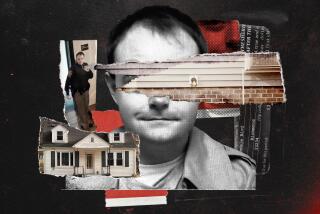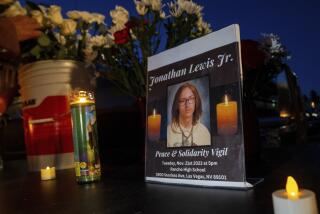Edwards Proves His Mettle Given Fighting Chance : College football: Arrest after brawl caused defensive back to leave Arizona but he has resurrected career at Valley.
The evening of March 8, 1989, on the campus of the University of Arizona was, according to Tucson police, a night of racially motivated beatings. When it was over, 11 people required medical care. And Sam Edwards, a former All-City Section football player from Reseda High, was in jail, charged with 11 counts of assault.
This is the story Edwards tells of that night:
“Myself and three other members of the Arizona football team were standing around on campus. One of my friends was talking to his girlfriend, a white girl. All of a sudden these five guys, these cowboy-boot, fraternity kind of guys, walked by.” One of them, according to Edwards, looked at the woman and made a racial slur about her companions.
“Well, pretty soon there was a fight,” Edwards said.
When the fight was over, Edwards and his three friends--all four of them black and undeniably victorious in their scuffle against the five men--retired to their dormitory rooms for the night, Edwards said. But through the night, there were other fights on the Arizona campus between blacks and whites. In the morning, police arrested Edwards and the other three football players and charged them in all of the fights.
Soon afterward, Edwards and the other three had been bounced from the University of Arizona. They were given two-year suspensions, even though they shouted out their innocence and the police story already had begun to unravel. It was the spring of 1989, and stories of football players’ antisocial behavior were echoing from the campuses of the University of Oklahoma and the University of Colorado.
Arizona, it seems, was determined not to join that list.
Today, school administrators deny feeling any such pressure.
“There was no relationship whatsoever to the problems at any other university,” said Bob Bockrath, Arizona’s senior associate athletic director. “My sense is there was no relationship whatsoever between our action and Oklahoma or Colorado or any other school. I certainly hope that was the case. I believe it was just coincidental.”
The stifling afternoon sun beats down on the practice field at Valley College in Van Nuys. The grass is dead or dying from lack of water. Among the group of defensive backs going through their daily drills, one stands out. At 6-foot-3 and more than 200 pounds of sinewy muscle, he glides effortlessly across the grass clumps.
Sam Edwards, a young man with a world of talent for football, a guy who seemed to have more than a fleeting shot at playing in the NFL some day, has fallen hard.
Instead of pounding ballcarriers and receivers in the Pacific-10 Conference before crowds of 60,000 or more and national television audiences each Saturday, he toils in near anonymity in the Western State Conference, playing for the Valley College Monarchs before tiny gatherings of close friends and relatives alongside clumpy fields.
“Some days, I can’t even believe what has happened to me,” said Edwards, who redshirted his freshman year at Arizona. “I was in the penthouse of college football two years ago. Now I’m in the ghetto of college football. I can’t understand how it all happened.”
Edwards has made the most of his situation. He easily could have put his cleats away and sulked himself out of the game. But after the banishment from Arizona, he realized quickly that he must keep himself on a playing field and prepare for a comeback in big-time college football.
So he came home and found his way to Valley College. And he has played hard. In 1989, he was named the Western State Conference’s best defensive player after making a conference-high eight interceptions.
This year, pulled from his usual position and moved closer to the line as a linebacker in most situations, he has responded once again. In a game earlier in the season against Glendale, his raw talents just overwhelmed the opposition. Edwards, playing furiously, made 14 unassisted tackles, assisted on five others and returned a fumble 43 yards for a touchdown.
“That game was a freak show,” Valley College coach Chuck Ferrero said. “At one point he made seven tackles in a row. It was the best defensive game by one player that I have ever seen. On one play, he pulled the ball out of the ballcarrier’s arms and went 60 yards for a TD.
“I have never seen a game like it.”
At times, when the fury peaks, Edwards appears to be a thoroughbred racing against a field of donkeys. He said those moments make him happy. But soon, the high is replaced by deep depression.
Edwards knows he does not belong here.
“I think about it every week when I’m watching a nationally televised game and I know that should be me on that field,” he said. “I try to shake it off, but I always remember what that beautiful stadium at the University of Arizona looked like on game day. I can’t forget it.
“When I play now, I feel I have to play much better than the guys I play against. I’m supposed to be better. I can’t be just as good, be just one of them. I have to show myself and everyone else that it was no joke, that me getting a Division I scholarship was not a fluke. I have to show every week that that is where I belong. Not here.”
After this season, Edwards said he will take the five recruiting trips allowed by the NCAA. He will have two years of eligibility remaining. He plans to use them wisely. He won’t name the schools that have approached him, only that they are in the West and Midwest and that you likely have heard of them.
As part of his agreement--if anyone dare call it that--with Arizona, he cannot go to a Pac-10 school other than Arizona. And it is unlikely that he would return to Tucson.
If he does, he will be arrested.
As the prosecutors from the Pima County Attorney’s Office began sifting their way through Edwards’ case and the police reports, they quickly determined that there were some problems. For starters, only the five men who got into the brawl with Edwards and his football teammates identified Edwards. Victims of other fights later that night did not. Police, it seemed, had assumed that if Edwards and his friends had been in one fight that night, they were involved in the others.
The 11 assault charges against Edwards were quickly reduced to six. Weeks later, after more investigation, three more were dropped. Attorney Theresa Millikin prepared to prosecute Edwards on three misdemeanor assault charges.
“To some extent, you can say the police overreacted,” said George Roylston of Tucson, who was Edwards’ attorney. “The black population of Tucson is roughly three percent, and most of that number are students at the university. The whole thing was blown out of proportion. These were Class 1 misdemeanor assaults and the next morning the local papers made it sound like these kids were involved in gangland slayings. Murder cases here get much less attention than this case did. It happened just after the football players at Oklahoma were charged with rape, and people were ready to hammer any college athlete who got into any kind of brush with the law.”
By then, Edwards apparently decided he had seen enough of what he called “cactus-land justice” in Arizona. So he left, jumping a $500 bond and settling back into his parents’ Los Angeles home.
“It’s over with,” Edwards said. “I think they dropped the charges or something.”
Not quite.
“There is a warrant in Pima County for Samuel Edwards’ arrest,” Millikin said. “The case is still open and he still faces three assault charges. If he shows up again in Pima County, we will try our best to find him and arrest him. But because the assault charges are misdemeanors, there will be no extradition proceedings.”
There is little doubt, then, as to why Arizona is not on Edwards’ list of potential schools for his final two years of eligibility. Or why he has not fought the stipulation that he not attend another Pac-10 school. Might be a bit touchy for Edwards to try to explain to coach why he doesn’t think he’ll be making that trip to Tucson next week.
Through the long and painful ordeal, though, Edwards said he has grown and learned.
“In hindsight, I should have walked away that night, even though I believe we were provoked,” he said. “But today, I would not allow that situation to come to blows. I would have gotten out of there, knowing what I had to lose. I learned a lot in that 20 minutes. I was 18 years old and dumb. You think you know a lot when you’re 18, but you don’t know much. I am not a trouble-maker. I never was.”
More to Read
Go beyond the scoreboard
Get the latest on L.A.'s teams in the daily Sports Report newsletter.
You may occasionally receive promotional content from the Los Angeles Times.










